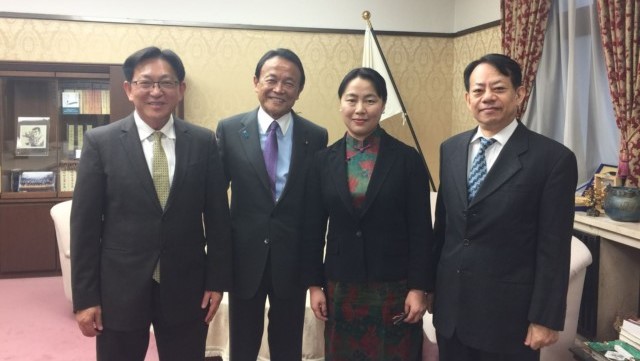
From left to right: AMRO Chief Economist Dr Hoe Ee Khor, Deputy Prime Minister and Minister of Finance of Japan Mr Taro Aso, AMRO Director Dr Junhong Chang, and Vice Minister of Finance for International Affairs Mr Masatsugu Asakawa.
SINGAPORE, November 14, 2017 – Abenomics has successfully raised both growth and inflation for Japan, while challenges remain in sustaining the strong performance, according to the preliminary assessment by the ASEAN+3 Macroeconomic Research Office (AMRO) after its Annual Consultation Visit to the country from October 31 to November 10, 2017.
The mission was led by Dr Jae Young Lee, AMRO Lead Economist, and participated by AMRO Director Dr Junhong Chang and Chief Economist Dr Hoe Ee Khor. Discussions centered on prospects for growth and inflation, policies for maintaining macroeconomic and financial stability, and structural reforms.
“The economy is expected to grow strongly at 1.6 percent this fiscal year and 1.2 percent next year, while inflation is expected to pick up to about 0.7-0.8 percent in both years” said Dr Lee. “Given the strong economic performance, fiscal consolidation should resume soon while monetary policy should remain accommodative and it may need recalibration to mitigate financial risks.”
The economy continued its strong growth supported by a robust recovery in global trade and a strengthening of private consumption and investment reflecting supportive macroeconomic policies. Household incomes have been rising as employment increases amid tightening labor market conditions while the wage growth remains slow. Corporate earnings have risen strongly since Abenomics started and business investment continues to increase.
The inflation for the Consumer Price Index (CPI) excluding fresh food is projected to be around 0.7-0.8 percent in the near-term and expected to be below the price stability target of 2 percent set by the Bank of Japan (BOJ) over the medium term.
Near-term risks are mostly from external conditions and tilted to the downside. These include geopolitical risks, protective trade policies or an unexpected slowdown among major trading partners. Medium-term risks are related to the sustainability of public finance and the stress in financial markets. Emphasis on supporting higher growth and inflation in macroeconomic policies over a prolonged period of time could erode fiscal discipline. In the financial market, the extended period of accommodative monetary policy by the BOJ has led to a squeeze on profit margins in the bank and insurance sectors, and a gradual build-up of financial imbalances.
To sustain the higher growth and inflation momentum over the long term, the authorities should implement a more comprehensive package of policy measures to address structural challenges. Fiscal policy should focus on restoring fiscal sustainability. Given the above-potential GDP growth rate, fiscal policy stance should be normalized soon in order to build up policy space against potential shocks. Fiscal spending should give priority to growth-promoting structural reforms, social investment, and policies to address structural challenges such as childcare support. When formulating the new fiscal consolidation plan, targets should be credible over the medium term based on long term trends in demographics and spending needs. In addition, the 2019 consumption tax hike should be implemented as scheduled while taking into consideration the need for further tax measures. Expenditure restructuring envisaged in the “Economic and Fiscal Revitalization Plan” should be implemented as planned.
Monetary policy should remain accommodative for now to allow more time for the virtuous cycle – from tight labor market and the positive output gap into higher wages and prices – to work. However, the easy monetary policy may need to be recalibrated while closely monitoring developments in economic activity and prices as well as financial conditions. In this regard, recent policies of keeping close communication with the market are commendable.
Financial policies should address the low profitability of regional banks and ensure financial system and market stability. Financial authorities should engage closely with regional financial institutions by encouraging them to diversify business strategy and consolidate in response to low profitability and demographic trends. Close macro-prudential monitoring of potential risks from financial imbalances should also be continued.
Government efforts to tackle demographic challenges and structural reforms to lift potential growth are commendable and should be at the top of the policy agenda. Policies should be implemented and enhanced to increase labor participation and greater use of foreign workers, to promote productivity-enhancing investment, human capital investment, deregulation and targeted investment in promising sectors, and to broaden the market through key trade negotiations. Government initiative to improve work-life balance and productivity under the “Work Style Reform” is commendable and should be implemented.
The mission team would like to express its appreciation to the Japanese authorities for their excellent assistance and hospitality. The consultation visit has deepened AMRO’s understanding of the current macroeconomic and financial situation, macroeconomic policy as well as structural reforms in Japan.
